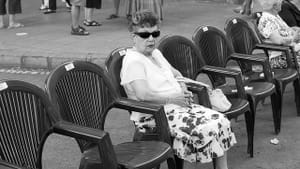Stay in the Loop
BSR publishes on a weekly schedule, with an email newsletter every Wednesday and Thursday morning. There’s no paywall, and subscribing is always free.
When in doubt, do something
Remembering Mom's feisty example

A woman walked into a hospital for a test. She was hours early, thanks to senior citizen transportation, which is notorious for missing pickup times, but usually for being late. In any case, the patient, in her late 60s or early 70s and without obvious disabilities, arrived three hours ahead of her appointment.
She was directed to the proper department and was finished in about 90 minutes. Returning to the lobby, she met the volunteer who had greeted her when she arrived and said the van would not return for her until 2 that afternoon. The volunteer asked if she had asked the service for an earlier pickup. "I called twice. They said no," she said, emphasizing the last word. It wasn’t an unfamiliar response; patients using senior citizen transportation often have long waits. Could she call a friend or family member, the volunteer asked. “My daughter works,” the woman replied.
How about a bus, the volunteer suggested, explaining that several lines ran nearby, and the hospital had current schedules and route maps. “I’ve only been here three years,” the woman said with finality, heading toward a bench near the door to wait for her ride.
Senior transport should be better. It should be more responsive and reliable for the safety and convenience of older passengers, many of whom are frail and need door-to-door transportation, or who can’t or shouldn’t drive.
That is not my point.
Do nothing, or something
The woman was physically capable of taking a bus and might have used the help offered to see if one would get her home. She had plenty of time to look at the schedules, in any case. Instead, she made an excuse, she had only lived in Philadelphia for three years. Maybe it was fear of not knowing, or the habit of relying on other people, but she just couldn’t see that she had an alternative, though it would take effort and involve uncertainty.
We all have these moments, when we can’t see our way out of problems. We are reluctant to do something unfamiliar, afraid that something bad will happen or we might fail. It’s easier just to fall back on what we know, what’s safe, even if it isn’t ideal.
Then life throws a curve and we are in uncharted territory, when even bad solutions don’t exist. Suddenly we have to figure our way out of a completely new situation, and there will be nothing to rely on but ourselves, and if we have been really lucky, we will have a good example to fall back on.
Learn by doing
The woman in the hospital had had no such example to summon, but the annoyingly helpful volunteer — me — did. My mother, for 87 years, was exactly the opposite of the patient waiting hours for a ride home. In every circumstance, no matter how unfamiliar the terrain, however long the odds, she tried things. She took chances. However minimal the possibility of success, my mother was totally, everlastingly, and blessedly incapable of doing nothing.
At age nine, she walked herself to the train for summer camp. Her parents had reluctantly given permission for her to go away for a week, but stayed in bed that morning, thinking that their middle daughter wouldn’t leave for the station alone. But my mother went to camp and proudly reported that, “The other kids cried when they got there. I cried when I had to come home.”
The Great Depression marked my mother’s high school years and early working life. In high school, she walked 90 blocks a day to save 15 cents carfare, a practice that enabled her to purchase a class ring and yearbook without asking her parents for money they didn’t have. As a salesgirl in Gimbels department store, she turned her salary over to her mother, but when my grandmother said she should keep her commissions, she worked like a demon.
Late in life, when she contracted a rare illness and faced a cascade of health problems, my mother refused to accept the inevitable. She could no longer walk, yet took any treatment or therapy that had a chance of getting her back on her feet. Wherever she went in the last year of her life, whether doctors’ offices, hospitals, rehab centers, and finally, briefly, a nursing home, whether using a walker or, eventually, a wheelchair, my mother remained alert, aware, engaged, and determined, interested in the world around her, even as it closed in.
The woman who was resigned to a three-hour wait reminded me that, put in that same situation, Mary would have pulled up a chair and a cup of coffee, and started checking available bus routes. No: Mary would have already known what bus would get her home. And when she got there, she’d place a call to the senior van service that they would remember.
I hope, when in a tight spot, I follow that example.
Sign up for our newsletter
All of the week's new articles, all in one place. Sign up for the free weekly BSR newsletters, and don't miss a conversation.